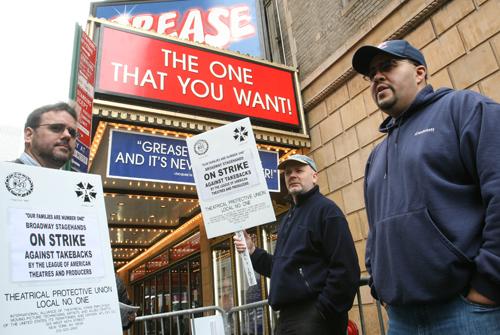Broadway stagehands, producers to resume talks this weekend

November 15, 2007
NEW YORK – With the lucrative Thanksgiving week looming, striking Broadway stagehands and theater producers say they will start talking again – this weekend.
Local 1 and the League of American Theatres and Producers jointly announced Wednesday that they will resume negotiations “at an undisclosed place and time.”
“No comment from either organization will be issued until further notice,” both sides said in a joint statement.
Thanksgiving weekend is one of the best times for business on Broadway, with many shows usually selling out. It may have added to pressure for the union and producers to reignite their deadlocked negotiations, which have languished since last week.
“Today’s announcement … is a very important step forward,” said Mayor Michael Bloomberg, who reiterated his willingness “to help resolve these disagreements and let the shows go on.”
Get The Daily Illini in your inbox!
The stagehands walked off the job Saturday, shutting down 27 plays and musicals.
All week, the mood along Broadway had been one of resignation and gloom.
Wednesday was to have been the New York premiere of “The Farnsworth Invention,” the eagerly anticipated return to Broadway of playwright Aaron Sorkin, the creator of such television shows as “The West Wing” and “Sports Night.”
Instead, the Music Box Theatre, one of Broadway’s most elegant playhouses, sits dark along with 26 other theaters as Local 1, the stagehands union, and the League of American Theatres and Producers remain deadlocked in the fifth day of an acrimonious contract dispute.
Silent pickets stand in front of locked theater lobbies. Other unions, including Actors’ Equity and the musicians’ local, have lined up in support of the stagehands. Even Broadway press agents, instructed by their own union to honor Local 1’s picket line, are silent.
“The Farnsworth Invention,” Sorkin’s look at the birth of television starring Hank Azaria, wasn’t the only opening scheduled this week. “The Seafarer” by Irish playwright Conor McPherson had been set for Thursday. It, too, is shut, and its opening uncertain.
McPherson, author of “The Weir” and “Shining City,” says the challenge now is to psychologically stay ready even though the actors aren’t allowed to rehearse at the theater. “We’ll be doing our best to sort of get together and talk about it and keep our chin up,” he said.
Previews, which began in late October, stopped after last Friday’s performance.
“I’m confident that if we get a chance to open, it should be all right,” the playwright said. “We’ll just keep our fingers crossed and pray – pray that the testosterone levels drop on both sides of the strike and see how it goes.”
“August: Osage County” imported from Chicago’s Steppenwolf Theatre Company, had an opening planned for next Tuesday. But the play by Tracy Letts also went dark in mid-previews, and its producers have offered to fly the Chicago actors home for the duration of the walkout.
In a gesture of support, Second Stage Theatre has offered a little bit of off-Broadway hospitality to the Steppenwolf actors. Carole Rothman, its artistic director, has set aside 15 tickets for the Wednesday matinee performance of “Edward Albee’s Peter and Jerry” for the Chicago performers who remain here.
The contract dispute has focused on how many stagehands are required to open a Broadway show and keep it running. That means moving scenery, lights, sound systems and props into the theater; installing the set and making sure it works; and keeping everything functioning well for the life of the production.
The existing contract requires theaters to use at least four stagehands for plays: a carpenter, a property master, an electrician and a fourth, either a sound technician, a fly man or a second stagehand. A musical also requires four stagehands, and a fly man is mandatory. This is the person in charge of scenery, props and other things that move up or down, or from offstage – for example, the “bubble” that transports Glinda in the musical “Wicked.” The fly man also raises and lowers the curtain.
The league wants to have flexibility in how many stagehands are hired for shows, and does not want to use four if all are not needed.
The union also has cost of living and pension concerns. The annual salary for stagehands ranges from $67,500 to $88,500, according to the union, which would not disclose what increases it seeks.






